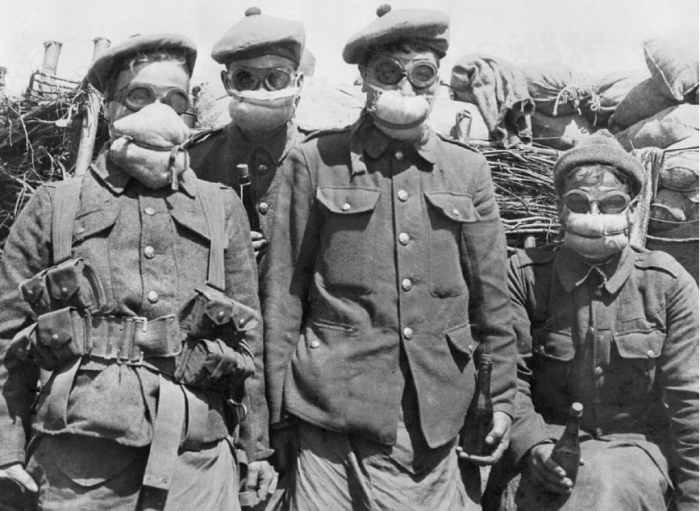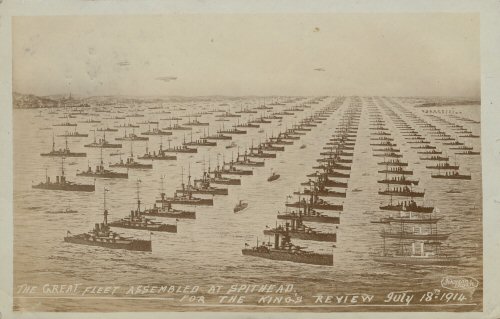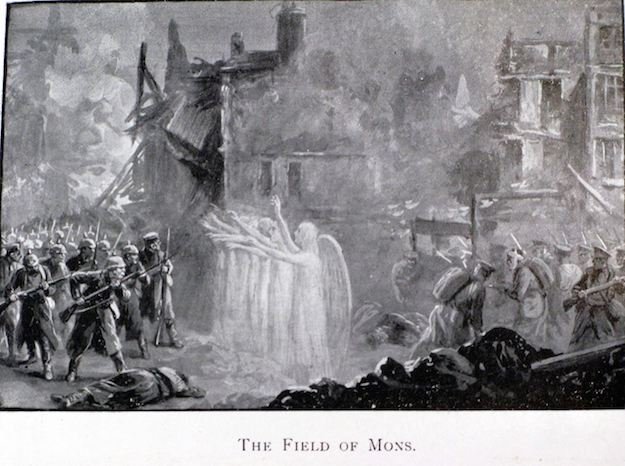
For my twelfth (and last?) contribution to ABC New England's Road to War series, I spoke about what was undoubtedly the most important battle to take place in late April 1915, the Second Battle of Ypres in Flanders. The reason why this was so important is because it opened with the first successful, large-scale poison gas attack in the history of warfare (the first unsuccessful attack had been at the Battle of Bolimov on the Eastern Front at the end of January). I looked how the particular gas used by the Germans, chlorine, worked in chemical, biological and military terms, the role played by Fritz Haber in developing it, the shattering effect it had on the French lines, and the unreadiness of the German army to do much to exploit its success. I also noted briefly the prewar laws against the use of poison gas and its subsequent career in the war and after, including in the present Syrian civil war.
Image source: Imperial War Museum.
![]() This work is licensed under a Creative Commons Attribution-NonCommercial-NoDerivatives 4.0 International License.
Permissions beyond the scope of this license may be available at http://airminded.org/copyright/.
This work is licensed under a Creative Commons Attribution-NonCommercial-NoDerivatives 4.0 International License.
Permissions beyond the scope of this license may be available at http://airminded.org/copyright/.





JDK
Oh, no! Why 'last'?
Erik Lund
Well, the "road to war" is pretty much over, after all, now that poison gas has failed to restart "open" warfare. Truly a turning point in world history, and I don't just say that as a Canadian :-)
From here on it's the Eastern Front, which nobody cares about, trench battles on the Western Front, and some pointless sideshows in the Middle East. . . In fact, isn't the hundredth anniversary of one of those coming up soon?
JDK
Brett's and the previous broad/podcast (on the Armenian Genocide) were excellent as ever.
Sadly, in contrast, I'm not impressed by the public engagement of most historians for the last year, it seems to have been typified by irrelevant pedantic arguments about details that no-one but they would care about, and a superior 'lecture from the big chair' approach that's hopeless in 2015. The UNE & ABC effort has been an honourable exception, and that's why I'd like it to continue.
Brett Holman
Post authorJDK:
Thanks for your kind words (I should say that the Armenian genocide one was by my colleague, Nathan Wise). The reason why I said this might be my last one -- and as it turns out, it was -- is because our original conception for the series was to try to tell the story of the war before Gallipoli, because that period gets such short shrift in Australia. And so with the coming of Anzac Day (a few days after my last show), that was that. We did talk about continuing, and in some ways it's a shame we didn't (I would have like to have talked about the Lusitania and the first Zeppelin raids on London, both centenaries falling this month); but they are quite time consuming to prepare and I've got plenty of marking and teaching to keep me busy! We may come back to it in some form.
ErrolC
I found the wide view delivered at about the 'right' pace useful. I might have to find a RSS feed that does similar - I follow a Twitter account that posts NZ newspaper snippets on this way.
Well done Brett and the rest of the team.
Brett Holman
Post authorThanks, Errol! If you find any good ones, please report back. The Daily Telegraph has a good Twitter feed for its First World War archive, but there must be others -- what's the NZ one you follow?